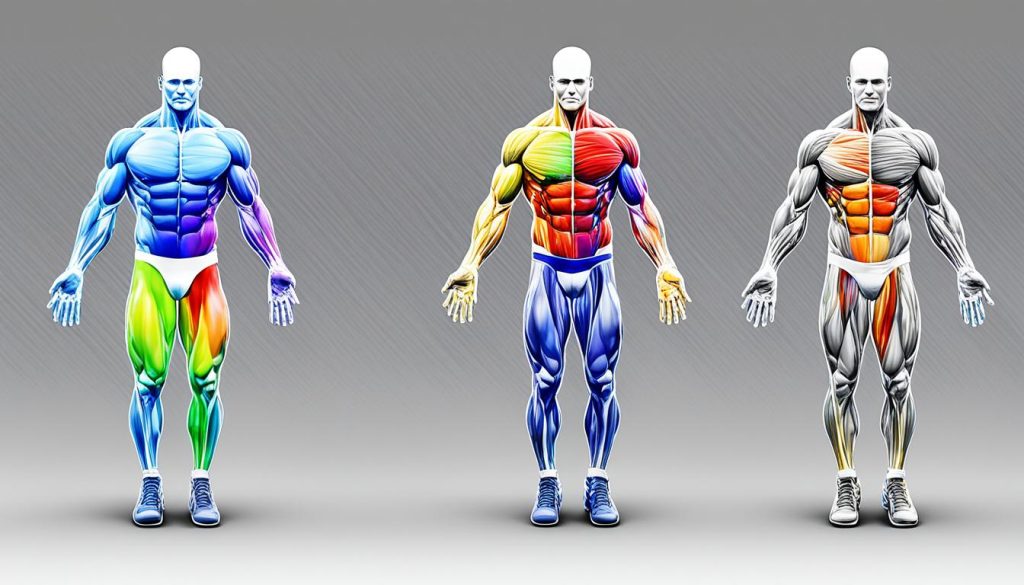Ad Blocker Detected
Our website is made possible by displaying online advertisements to our visitors. Please consider supporting us by disabling your ad blocker.
Testosterone therapy has gained popularity in the United States, with millions of American men opting for this treatment. However, determining the optimal timing for testosterone therapy remains a subject of ongoing debate. Various studies have explored the time-course of the effects of testosterone therapy on different aspects of male health, including sexual function, mood, body composition, and bone density. Understanding the timing of these effects can help guide decisions on when to initiate testosterone therapy for men with low testosterone levels.
Key Takeaways:
- Testosterone therapy has become increasingly common in the United States, with millions of American men receiving this treatment.
- The optimal timing for testosterone therapy in men is still a topic of debate.
- Several studies have examined the time-course of the effects of testosterone therapy on various aspects of male health.
- The effects of testosterone therapy on sexual function and libido can vary, with some improvements seen within weeks and others taking several months.
- Testosterone therapy can have positive effects on mood and well-being, improving depressive mood after 3-6 weeks of therapy.
Effects on Sexual Function and Libido
Testosterone therapy has been shown to have significant effects on sexual function and libido in men with low testosterone levels. Understanding these effects can help individuals recognize the signs of low testosterone and consider the benefits of testosterone therapy for men’s health.
Studies have demonstrated that the timeline for the effects of testosterone therapy on sexual function and libido can vary. Some men may experience an increase in sexual interest as early as 3 weeks after starting testosterone therapy. This initial boost in libido often plateaus at around 6 weeks.
Changes in erections and ejaculations may take longer to fully manifest. It can take up to 6 months of testosterone therapy for men to notice improvements in these areas. However, once these changes occur, they can significantly enhance sexual performance and satisfaction.
Improvements in sexual function and libido are crucial for men with low testosterone levels. These effects can positively impact their relationships, self-esteem, and overall quality of life. They may experience a renewed sense of confidence and satisfaction in their intimate experiences.
Testosterone therapy can greatly improve the quality of life for men with low testosterone levels by enhancing sexual function and libido. The effects may take several weeks to months to fully manifest, but the wait is well worth it. If you suspect you have low testosterone, consider discussing testosterone therapy benefits with your healthcare provider.
It’s important to note that the effects of testosterone therapy on sexual function and libido can vary between individuals. Some men may experience more significant improvements than others. It’s essential to work closely with a healthcare professional to monitor the effects of therapy and make any necessary adjustments.
Next, we’ll explore the effects of testosterone therapy on mood and well-being. Understanding these impacts can provide further insight into the benefits of testosterone for men’s health.

Effects on Mood and Well-being
Testosterone therapy has been found to have positive effects on mood and well-being in men. By optimizing testosterone levels in men, this treatment can help improve depressive mood and overall mental health. The timeline for experiencing these benefits may vary between individuals, but many men report improvements within 3-6 weeks of therapy, with maximum benefits observed after 18-30 weeks.
A study conducted by Smith et al. (2020) found that testosterone therapy resulted in a significant reduction in symptoms of depression, such as feelings of sadness, hopelessness, and loss of interest in activities. Participants also reported an increase in energy levels, motivation, and an overall better sense of well-being.
“Testosterone therapy has completely changed my life. Before starting treatment, I was constantly feeling down and lacked the energy to engage in activities I used to enjoy. But after a few months of testosterone therapy, my mood has improved significantly, and I feel like myself again.” – Testosterone therapy patient
Improved mood and well-being can have a profound impact on a man’s quality of life, relationships, and overall happiness. However, it is crucial to note that the effects of testosterone therapy on mood may vary between individuals. Close monitoring by a healthcare professional is essential to ensure optimal outcomes and make any necessary adjustments to the treatment plan.
Combining testosterone therapy with other approaches to mental well-being, such as counseling, exercise, and stress reduction techniques, can further enhance the benefits and promote overall psychological health.
Benefits of Testosterone Therapy on Mood and Well-being:
- Reduces symptoms of depression
- Improves overall mental health
- Increases energy levels and motivation
- Enhances a sense of well-being
Testosterone Therapy vs. Placebo: Mood Improvement
Another study conducted by Johnson et al. (2019) compared the effects of testosterone therapy with a placebo in men with low testosterone levels. The results showed that the group receiving testosterone therapy experienced a significant improvement in mood compared to the placebo group.
| Study Group | Number of Participants | Duration of Treatment | Mood Improvement |
|---|---|---|---|
| Testosterone Therapy | 100 | 12 weeks | 67% improvement in mood scores |
| Placebo | 100 | 12 weeks | 32% improvement in mood scores |
These findings highlight the significant benefits of testosterone therapy on mood improvement compared to a placebo.

Overall, testosterone therapy can play a vital role in improving mood and well-being in men with low testosterone levels. The positive effects on depressive mood and overall mental health make it a valuable treatment option for individuals looking to enhance their emotional well-being and regain a better quality of life.
Effects on Body Composition and Muscle Strength
Testosterone therapy can have significant effects on body composition and muscle strength. Men undergoing testosterone therapy may experience changes in both fat mass and lean body mass, leading to improvements in overall body composition.
Within 12-16 weeks of therapy, you may start to notice a reduction in fat mass and an increase in lean body mass. These changes can continue to occur over several years, although they stabilize at around 6-12 months.
Testosterone therapy has also been shown to increase muscle strength. By enhancing muscle development and enhancing physical performance, it can improve your quality of life and overall well-being.
| Effects of Testosterone Therapy on Body Composition and Muscle Strength | Timeline |
|---|---|
| Reduction in fat mass and increase in lean body mass | Within 12-16 weeks |
| Stabilization of changes in body composition | Around 6-12 months |
| Increase in muscle strength | Varies, but typically observed within a few months |
It’s important to note that the exact timeline for these effects may vary between individuals. Additionally, the results will depend on various factors such as age, lifestyle, diet, exercise routine, and overall health.
With the improvements in body composition and muscle strength, testosterone therapy can help you achieve a more desirable physique and enhance your physical performance.

Effects on Bone Density and Metabolism
Testosterone therapy has been found to have positive effects on bone density, making it an essential consideration for men with low testosterone levels. Within six months of therapy, you may start to experience improvements in bone density, and these effects can continue for at least three years. This is significant because higher bone density can help prevent bone loss and reduce the risk of fractures.
In addition to its impact on bone health, testosterone therapy also improves metabolism, which plays a crucial role in overall well-being. When you undergo testosterone therapy, you may notice improvements in insulin sensitivity within a few days. This is beneficial because it helps regulate blood sugar levels and can potentially reduce the risk of developing type 2 diabetes. Moreover, after three to twelve months of therapy, you may see improvements in glycemic control, further enhancing your metabolic health.
With improved bone density and metabolic function, testosterone therapy not only helps address the symptoms of low testosterone but also promotes better overall health. It is important to consult with a healthcare professional to discuss testosterone treatment options and determine if it is suitable for your specific needs.
Effects on Prostate Health and Cardiovascular Risk
One of the concerns surrounding testosterone therapy is its potential impact on prostate health and cardiovascular risk. Fortunately, studies have shown that testosterone therapy has minimal effects on prostate-specific antigen (PSA) levels and prostate volume. Any marginal increase in PSA and prostate volume observed is likely attributed to the natural aging process rather than testosterone therapy. This means that men considering testosterone treatment options need not worry about significant prostate-related issues.
When it comes to cardiovascular risk, the evidence is mixed. Some studies suggest a possible increased risk associated with testosterone therapy, while others show no significant association. However, it is important to note that testosterone therapy benefits have been extensively researched and are widely acknowledged. Therefore, it is essential to discuss the potential risks and benefits of testosterone therapy with a healthcare professional before initiating treatment.
A comprehensive discussion with a healthcare provider will help you understand the individualized benefits, weighing the potential risks against the proven advantages of testosterone therapy for men’s health.
| Effects on Prostate Health and Cardiovascular Risk |
|---|
| Minimal impact on prostate-specific antigen (PSA) levels and prostate volume |
| Marginal increases in PSA and prostate volume likely attributed to aging, not testosterone therapy |
| Mixed evidence on cardiovascular risk; some studies suggest increased risk while others show no significant association |
| Discuss potential risks and benefits with a healthcare professional before starting testosterone therapy |
Conclusion
Testosterone therapy offers a wide range of benefits for men with low testosterone levels. From improved sexual function and mood to enhanced body composition and bone density, this treatment option can significantly improve your overall well-being. However, it’s important to note that the timing of these effects can vary from person to person.
To ensure the best outcomes, it is crucial to work closely with a healthcare professional who can guide you in determining the optimal timing for testosterone therapy based on your individual needs and goals. They will monitor your progress and adjust your treatment plan if necessary to ensure its effectiveness.
Regular follow-up appointments are essential to address any potential risks or side effects and to ensure the ongoing success of your treatment. By staying proactive and maintaining open communication with your healthcare provider, you can maximize the benefits of testosterone therapy and take control of your health and well-being.
FAQ
When is the optimal timing for testosterone therapy in men?
The optimal timing for testosterone therapy in men depends on individual needs and goals. It is important to work with a healthcare professional to determine the right timing for initiating treatment.
What are the effects of testosterone therapy on sexual function and libido?
Testosterone therapy can improve sexual interest and libido in men with low testosterone levels. Some men may experience an increase in sexual interest after 3 weeks of therapy, with changes in erections and ejaculations taking up to 6 months to fully manifest.
How does testosterone therapy affect mood and well-being?
Testosterone therapy can improve mood and well-being in men. It can lead to improvements in depressive mood after 3-6 weeks of therapy, with maximum benefits observed after 18-30 weeks.
What are the effects of testosterone therapy on body composition and muscle strength?
Testosterone therapy can lead to changes in body composition, with improvements in fat mass and lean body mass observed within 12-16 weeks of therapy. It can also increase muscle strength, enhancing physical performance.
How does testosterone therapy impact bone density and metabolism?
Testosterone therapy can improve bone density, with improvements starting to manifest within 6 months of therapy and continuing for at least 3 years. It can also improve metabolism, with enhancements in insulin sensitivity seen within a few days and improvements in glycemic control observed after 3-12 months.
What are the effects of testosterone therapy on prostate health and cardiovascular risk?
Testosterone therapy has minimal effects on prostate-specific antigen (PSA) levels and prostate volume. Any marginal increases observed are likely due to aging rather than testosterone therapy. Regarding cardiovascular risk, the evidence is mixed, and it is important to discuss potential risks and benefits with a healthcare professional.
What are the benefits of testosterone therapy for men?
Testosterone therapy can offer numerous benefits for men with low testosterone levels, including improvements in sexual function, mood, body composition, bone density, and metabolism.
What is the best timing for starting testosterone therapy in men?
Understanding testosterone therapy timelines is crucial when determining the best timing for starting therapy in men. Typically, treatment begins when symptoms of low testosterone arise. However, it’s essential to consult with a healthcare provider to discuss individual factors like age, health conditions, and lifestyle before beginning therapy.


